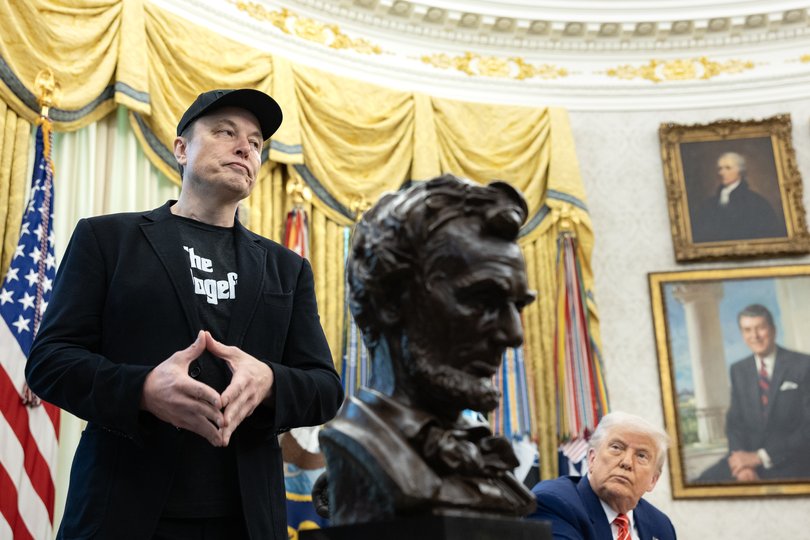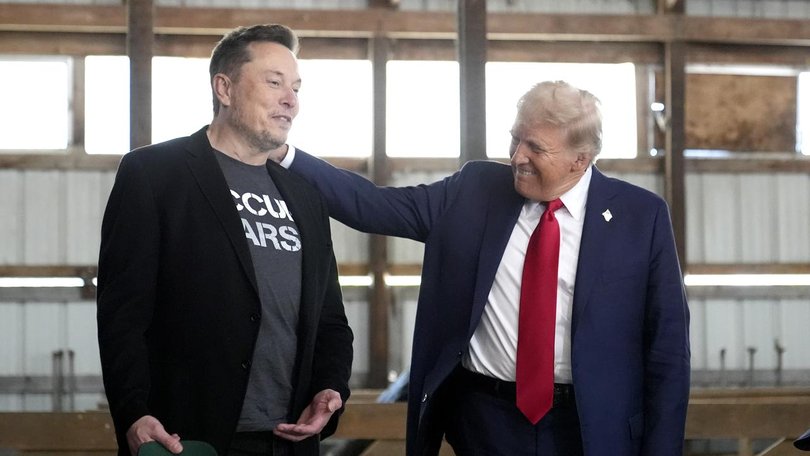THE WASHINGTON POST: Why Elon Musk is vulnerable in his conflict with Donald Trump
THE WASHINGTON POST: ‘It will come down to how much pain does Trump want to inflict,’ said Gene Munster, an analyst at Deepwater Asset Management.

In the days after the 2024 election, Elon Musk seemed unstoppable.
After he plowed at least $288 million into helping elect President Donald Trump and other Republicans, the payoff for the Tesla and SpaceX CEO was immediate. Tesla’s stock soared, making the world’s richest man even richer. His influence in Washington was incomparable, and government support for his ambitions — whether launching spaceships to Mars or autonomous cars across America — seemed more plausible than ever.
Now, all of that could be in doubt.
Sign up to The Nightly's newsletters.
Get the first look at the digital newspaper, curated daily stories and breaking headlines delivered to your inbox.
By continuing you agree to our Terms and Privacy Policy.The spectacular public feud last week between Musk and Trump has laid bare just how much Musk may lose if their rocky relationship continues to unravel. While Trump and the GOP have benefited from Musk’s money, Musk is most vulnerable if the president uses the levers of government to retaliate - a prospect the president raised in a message last week threatening to cancel Musk’s companies’ federal contracts.
“It will come down to how much pain does Trump want to inflict,” said Gene Munster, an analyst at Deepwater Asset Management.
Over the weekend, Musk appeared to take a step to de-escalate by deleting some of his most acrimonious messages on X about Trump. While Trump has resisted going all-out in clashing with his former ally, on Saturday he threatened “very serious consequences” against Musk if he were to back Democrats. Musk hasn’t said he would do that but suggested he would like to found a new political party.
A Washington Post analysis this year found that the billionaire and his businesses have received at least $38 billion in government contracts, loans, subsidies and tax credits over the years.

The assistance, The Post found, helped catapult Musk into becoming the richest person in the world. According to Bloomberg, the public feud erased $34 billion from Musk’s personal net worth, the second-largest loss ever in the history of the Bloomberg Billionaires Index of the 500 wealthiest people in the world.
Musk and Tesla did not respond to a request for comment.
Tesla — the electric car company that has been the biggest source of Musk’s wealth as its stock price soared in recent years - has been under pressure as its chief executive has spent time in politics, particularly in overseeing the U.S. DOGE Service. The company’s shares are down more than 20 percent year-to-date, falling precipitously Thursday as the verbal warfare between Trump and Musk escalated before slightly rebounding Friday.
The electric vehicle company has already suffered steep losses from the blowback to his work with the Trump administration, culminating in a 71 percent decline in profit in its latest quarter and a double-digit percentage slip in sales. Analysts estimate the company will suffer even more from Trump’s proposed spending and tax bill, which would largely end the $7,500 federal tax credit for electric vehicle buyers that has helped drive demand over the years. That would translate to a hit of about $1.2 billion to Tesla’s full-year profit, according to analysts at JPMorgan.
There are also several open federal investigations into Tesla’s driver-assistance technology, and the National Highway Traffic Safety Administration last month sent Tesla a letter of inquiry to understand how Tesla plans to launch its robotaxi and the safety measures it is taking. The letter was a sign that the scrutiny on Musk’s company might continue, despite his involvement with the administration.
Musk has been gradually pulling back from his role in the government, with a promise to return his attention to his business empire. He is betting heavily on the launch of robotaxis in Austin this week to reverse Tesla’s fortunes and appease investors. Last week, he wrote on X that Tesla has been testing self-driving Model Y cars.
Musk is also contending with angry shareholders who are calling on the CEO to step up or resign. Last week, a group of activist Tesla shareholders sent a letter to board chair Robyn Denholm calling for guarantees that Musk will devote at least 40 hours a week to the electric-vehicle maker after spending much of the past year focused on politics.
Brad Lander, the New York City comptroller who oversees the NYC public pension system that holds more than 3 million shares of Tesla, said Thursday’s “schoolyard fight” between Trump and Musk is “another reminder of how disastrous this White House and its DOGE experiment have been for Tesla shareholders.” Lander - who is running for New York mayor - said that the NYC pension systems lost more than $150 million in value in a single day.
“This should be a wake-up call for all Tesla shareholders watching silently from the sidelines,” Lander said.
The feud also comes at a tender moment for Musk’s other companies. Musk is making ambitious bets in increasingly crowded spaces - artificial intelligence and robotics - that could emerge as rich landscapes for policymaking and regulation. His artificial intelligence start-up xAI is a competitor to OpenAI, which has established an early lead in the race to deploy AI-powered tools for consumers. (The Washington Post has a content partnership with OpenAI.)

Musk is also seeking to bring brain-computer interfaces, where computer chips are implanted in brains to enhance human function, to the mainstream with another of his companies, Neuralink, that operates in a heavily regulated space.
Meanwhile, the threat by Trump on Thursday to cancel SpaceX’s government contracts sent shock waves through the federal bureaucracy, which has grown reliant on SpaceX for several critical missions. While federal procurement officials say terminating SpaceX’s contracts is highly unlikely, the threat highlighted how dependent the government has become on SpaceX and prompted federal officials to encourage other space companies to accelerate their investments in alternatives.
Musk’s company provides the only way NASA can fly astronauts to the International Space Station. SpaceX also launches sensitive satellites for the Pentagon and intelligence agencies. Over the years, SpaceX has leveraged billions of dollars in federal funding to build a robust commercial business. But it is still heavily reliant on funding from NASA and the Pentagon.
Ross Gerber, a Tesla investor who was once a vocal Musk supporter, estimated that the loss of government funding for SpaceX would cut the company’s value in half.
For months, Musk was a constant at Trump’s side as he led DOGE and oversaw sweeping layoffs and budget cuts. Investors hoped his alliance would deliver big returns for his companies: They imagined the relationship would cool Biden-era investigations into Tesla, ease regulations to speed the rollout of autonomous vehicles and give him an edge in securing lucrative contracts for his rocket company.
That marked a stark shift from Musk’s relationship with former president Joe Biden, whose administration excluded Tesla from an electric vehicle-focused event on the White House lawn. Trump, by contrast, hosted what resembled a Tesla infomercial at the White House in March, where five Teslas were parked in the driveway - and the president even selected a cherry red one for himself.
But some investors say he risks leaving Washington worse off than when he came.
“Who can run in and take the phone from him [Musk]?” asked Gerber, who has emerged as a critic of Musk’s actions and on Thursday sold half his position in Tesla. “You cannot get up in the morning and just spit on all your friends and people who literally create the success that you have.”
© 2025 , The Washington Post
